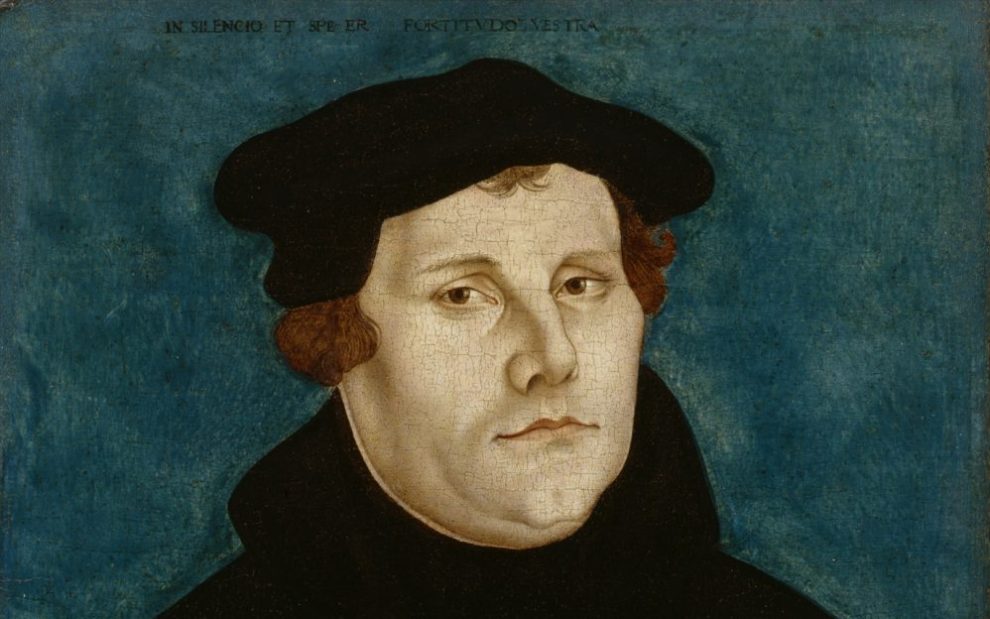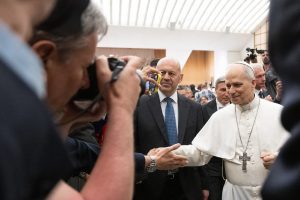When he was in seminary, Martin E. Marty and his classmates used to play a game: If your denomination were removed from the earth, what would you be? Marty always said Mennonite and Catholic. “Mennonites because they take seriously the disciplined life in Christ and because of their generosity. If there were a tornado, you know eight bearded guys are going to be there rebuilding the next day,” he says. “But liturgically I’d want to be Catholic.”
Of course Marty is neither—he is a Lutheran through and through. As one of the country’s foremost religious historians and commentators, an ordained minister in the Evangelical Lutheran Church in America, not to mention his namesake, Martin Marty was the perfect person to pen Martin Luther (Viking, 2004), a Penguin Lives biography of the leader of the Protestant Reformation.
The author of more than 50 books, Marty also has edited U.S. Catholic’s sister publication Context, a biweekly newsletter commenting on religion and culture, for 35 years. His many awards and commendations include the National Book Award and the National Humanities Medal.
Marty taught religious history for more than 35 years at the University of Chicago, where he is currently professor emeritus. Ever the teacher, he stopped by our office recently to discuss Luther and his impact on Christianity.
Why should Catholics care about Martin Luther?
I think the modern world in unimaginably different because of Luther, although he only accidentally helped produce that different world. Taking the Protestant Reformation along with the other reformations going on, including the birth of modern science and many Catholic reformations, a new world was born.
In the midst of it all was Luther, who was a genius at self-examination, a spiritual genius, as inexplicable as Mozart is to music. I don’t mean he had everything figured out, I just mean he was attuned to things. Most people don’t live with that intensity.
He could give voice to what a lot of other people were feeling in the 16th century. Once word got out that there was another means of having access to God and to heaven than venerating relics and buying indulgences, there were huge crowds everywhere. Luther wasn’t the only one who cared about corruption. There was a Reformation apart from him and with him and beyond him. But I think nobody did more than he to sanctify attention to conscience.
Did he really set out to form his own church?
No. In fact, I think he had a very narrow vision of the future. He really believed that the end was near. He knew there was an America, but he didn’t spend any time thinking about sending missionaries. Time was short.
He also didn’t really know how to set up shop. He had a radical sense that with Baptism you’re already a priest, a bishop, and a pope. But he could see that everybody setting up shop as their own priest would get chaotic, and he liked order.
Luther considered himself a Catholic all his life. He could criticize the papal system, but in his catechism he writes about “the holy Catholic Church.” As long as you baptize in the name of the Trinity, as long as you receive the elements of Communion and hear the reading of the gospel, that’s all it takes to have the church. But you have to have the church; he could never picture being alone.
Late in life Luther said, “Well, if they’re going to call us Lutherans, I guess I won’t fight that.” But he knew it was the enemy’s name for him, and he wasn’t happy with that.
What was Luther like personally?
He was a sensitive young person who made a vow to St. Anne to become a monk after getting caught in a storm, and he took his vow desperately seriously. He had an amazing level of guilt, fear, and intensity. He says he could walk in the woods and the stirring of a leaf would send trembling into his heart. His confessor was bored silly by Luther’s six-hour confessions.
But he was also a person who enjoyed life—he loved music, he loved good food, and he was a connoisseur of beers. Some historians have tried to make him out as a drunk. I couldn’t find any reference anywhere that found him drunk. Nobody would drink water at Wittenberg in 1517.
And later, after he left the monastery and married, we can tell he loved his wife, he loved children, he loved company. He was a master at talking to people. He could be funny, he could be vulgar, he could be telling, but he always got right to the heart.
One of my favorite Luther stories: When he was still an Augustinian monk, he is sent on a mission to Rome. When he gets there, he doesn’t spend any time describing the beauties of ancient Rome or the churches. He just goes relic hunting. And he starts making fun of some of them: How much of Mary’s milk was there, how much straw from the manger, how many pieces of wood from the cross?
But you can tell he still takes it seriously because he goes up the Scala Sancta, saying the Our Father at every step, then says he wished his parents were dead because then he could get them out of purgatory. But at the very top step, he stops and says, “Who knows whether all this is true?” I think that’s the kind of question many people were asking.
You use the German word Anfechtungen to describe Luther’s spiritual struggles. What does that mean?
I’d translate it as “the 3 in the morning feeling.” You wake up at 3 a.m. and it hits you how quiet the world is around you, how helpless you are, how short your life is, how little you are compared to the universe. Then you ask, “Is there any meaning in it?”
What hit Luther wasn’t the temptation of the world. He didn’t go to the monastery to give up the pleasures of life. He did give them up, but it wasn’t a big deal.
But what do you do when you think maybe these temptations are coming from God? That God is asking, “Do you deserve existence? Do you know that only a few will be saved? Mathematically the odds aren’t good for you.” Going to the monastery is good, but it isn’t good enough. It wasn’t the world standing between him and God. It was God standing between him and God.
But when he studies Paul’s letter to the Romans, he hears something different—the righteousness of God means that God has accepted the work of Christ and the whole transaction is finished. The only part of the transaction left is that you grasp it in faith, that you receive it as a gift. And when that hit him, he could never back off.
The concept of God’s righteousness means God no longer looks at us baptized people as something to be abolished. Rather, when God looks at the baptized person who is in faith, God doesn’t see you, God sees a Christ. When you serve the poor, you are Christ in that act. You can be scum of the earth still, but when God is looking at you in the righteousness of Christ, that’s what’s seen.
Once you have decided that righteousness is not to be bought by pilgrimages, relics, indulgences, or even by your own good works and merits, but that it is entirely a gift, you have to receive it and then put it to work.
Can you explain the concept of indulgences?
An indulgence removes some punishment for sin in response to certain prayers, almsgiving, or good works. The belief was that none of us will have been just enough, been merciful enough, given enough alms, or done our penance deeply enough in order to get past purgatory. But the church had something called a “treasury of merits” built up by Jesus and the saints that the faithful could draw upon.
In one sense, it could have been seen as a pastoral device, but it was so exploitable. In Luther’s time indulgences were being bought and sold. People wanted security. Luther hates the word security—it means you have it all fixed up with God. You’ve got this piece of paper that says you’re secure and you’re no longer going to be examining yourself and accepting the gifts of God.
But Luther likes the word assurance. Assurance is God’s continuing action toward you, which you receive. Security is what I have achieved by buying an indulgence or venerating the relics or going on a pilgrimage.
Much of the money for these indulgences was going to the building of St. Peter’s in Rome. It amazes me that when Luther was outraged by this, he really thought the pope would be glad that he was telling him this. He sent his 95 theses to the archbishop of Mainz in an almost groveling letter: “Oh your Excellency, you’ll be glad to know that we’re going to clean this up.” Of course, that would have undercut the whole system.
Didn’t he also nail the 95 theses to the church door at Wittenberg?
I think he did, but there were no eyewitnesses. Nobody saw the dramatic morning when he put the nails in the door. Somehow both the archbishop and the people in Wittenberg knew about them, but he may have only “posted” them, so to speak, by mailing them to the archbishop.
What else was going on in Europe around the time of Luther that led to the Reformation?
When I visit Eastern Europe today, there’s a big castle on every hilltop. The lord who lived there ran things. Although this feudal system was breaking up, people didn’t yet have an alternative. The person on the hill had knives and swords and horses and could do anything he wanted. He could rape your wife on your wedding night. He could change the price of your yield of what you’ve grown for him.
There was a violent tenor of life. It was a world where life expectancy was probably 30, you didn’t have medical care, and the Black Death had wiped out a third of Europe a century earlier. In that kind of world, heaven and the eternal questions are very alive. The traditional way of making sense of the world was through the sacraments, the rites of the church, the symbolism of the cathedral. You always had that refuge, that place where everything lined up: God, pope, bishop, priest, you. But none of it was quite working anymore. Among the simple people who did the relics or the pilgrimages, a system they previously counted on was getting less credible.
The beginnings of nationalism are stirring, too. You can see it as a response to the building of St. Peter’s. Every two-bit preacher in any little town could get a big crowd by saying, “Look at out church. The roof leaks, it’s in shambles, we have no money for it. And we have to send money to these luxurious people in Rome.” That really bred discontent.
The papacy was fighting for its own understanding and had been, by everyone’s acknowledgement, quite corrupt. I’ve seen a photograph of the end of a pew in a German church, I think from the 1470s, which has a carving of the jaws of hell and people are pushing the pope in. You don’t carve that if you’re happy.
How did Luther move toward the idea of a married clergy?
It wasn’t because he was angry at celibacy. He was enough of a church historian to know that married clergy had been part of the earlier church. And he could see celibacy’s economic value once he had to raise money for the new married priests.
He also wasn’t mad at monasticism. He valued a lot of what monastics did, he just didn’t like thinking you could make a vow that implied you were working your way into God’s favor.
I think the married clergy came out of his radical contempt of vocation. Luther believed there was a place for you in life that had only your name on it. Your profession or job could change, but all your life you would be responding to your vocation. And all vocations are equal—the woman washing diapers or threshing grain is just as honored as the contemplative or the prince.
Luther taught consistently that being married was a vocation. It wasn’t a second-rate thing. Both ordination and marriage have grace. Once you have that concept of theological leveling, it’s all about a calling to an office—a pastoral office or priestly office. It’s important, but not higher rank.
Marriage was never that high of a priority for him, but several years after he’s out of his monastic vows, Luther married a woman who he helped smuggle out of a monastery. He was never a real romantic—he wrote about how disconcerting it was after years in the monastery to wake up in the morning and see pigtails on the pillow. But I think he had true affection for his wife, Katie. She brewed the beer, raised the pigs, sheared the lambs, and kept the books. Once she walked into a room wearing all black. When Luther asked her why, she answered, “Well, there’s a funeral.” When he asked whose, she replied, “God’s. God must have died, because you couldn’t be that gloomy if God was alive.” She was good for him.
What is Luther’s legacy today?
Of course there’s devotion to scripture. On that, nobody did as much as he did.
The revaluation of music is also a big one. The average person in Luther’s time would go to Mass and the monks would be chanting behind a screen. What a change it was to bring it out and have the congregation do the singing. Nothing bothered him more than when a congregation didn’t sing. Once he just walked out on a service because of that.
He played the lute reasonably well and wrote hymns, the most famous of which is “A Mighty Fortress Is Our God.” He placed music next to theology, and I think he liked it a lot better. I hear him criticizing theologians, but never musicians.
Finally, his teaching on grace is his legacy. For Luther God is both hidden and revealed. Even in the revelation you still don’t get inside the divine majesty. You get God through the bread and wine of the sacrament, through the waters of Baptism, through scripture and prayer. That’s a means of grace.
But God is still hidden. You don’t see God when you pray, you don’t see God in the bread and wine, you don’t see God in the water. I find that extremely comforting teaching, that we don’t have to know everything. God has it figured out. I don’t have to.
Luther so overstated the case for grace that you can read him and then back off a ways and you’re still further than you were. I think that’s a legacy, because, in my view, you can never get enough of that in a sorrowing world.
This article also appears in the September 2004 issue of U.S. Catholic (Vol. 69, No. 12, page 24-28). Click here to subscribe to the magazine.
Image: Wikimedia Commons














Add comment